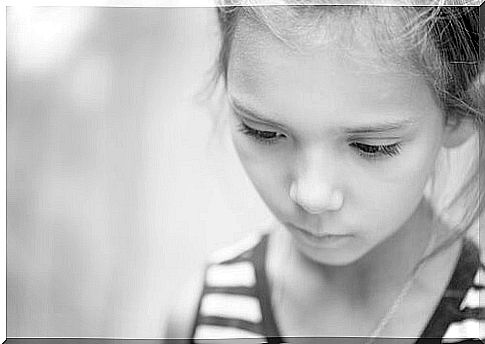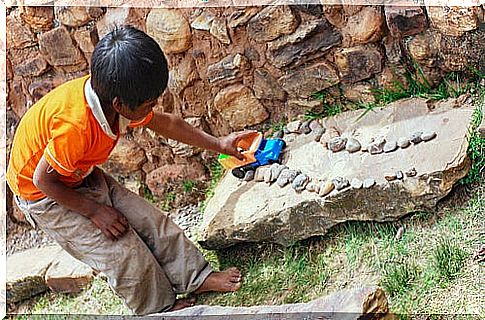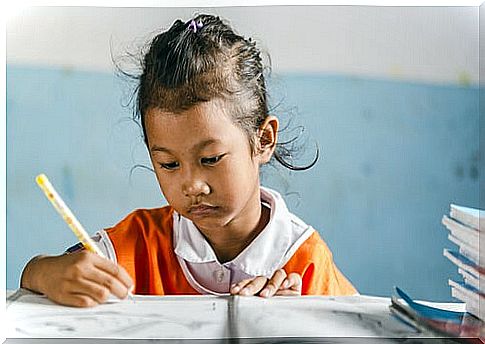Do You Know How Poverty Affects Children’s Brain Development?

Poverty is actually the great evil of human society. We live on a planet that could be a perfect orchard, as it has plenty of resources for everyone. However, much of the wealth is shared among a few. The saddest thing is that this distribution of resources even affects children’s brain development.
According to published data, 1% of the world’s population holds as much wealth as 80% of the planet’s people. If we look at Rafael Chirbes, “the only terrifying evil and the only real disease is poverty.” So we could even say that we live in a sick world where the main victims are our children.
Poverty affects children’s brain development
One of the most lucid minds in science today, Neil deGrasse Tyson, said that “perhaps the next Einstein is starving in Ethiopia.” But it is something that we will never know because children born in extreme poverty suffer significant alterations in their cognitive development.

At least, so says a new study published in the prestigious pediatric journal JAMA Pediatrics. In it, MRI scans of children born in various areas of purchasing power have been compared. The result is very clear and not very encouraging. Up to 10% less gray matter is found in the brains of children born to poor homes. However, in boys from wealthier backgrounds, this decrease is not found.
Poverty, a historical scourge
Beyond economic crises, poverty has been a scourge throughout human history. Thus, many studies have focused on investigating the effects that this social situation causes in individuals. In fact, it is considered that there is a direct relationship with drug addiction, alcoholism, prostitution, crime, etc.
Obviously, it is considered that the human being tries to survive instinctively. Hence, he looks for any means to earn a living, no matter how unlawful it may be. However, this is only the tip of the iceberg.
Poverty directly affects the intense emotional suffering suffered by the human brain. It creates an awareness of abandonment and forgetfulness, which leads people who suffer from it to feel despised by the system, a behavior that becomes reciprocal, so that empathy between people with resources and people without them is more difficult.
Other Effects of Poverty on Child Brain Development
As if that weren’t enough, the published study shows more negative effects of poverty on children’s brain development. Thus, poverty negatively affects the school performance of the children who live in it. In the different intelligence tests, they rarely achieve results similar to those obtained by children who do not live in a precarious situation.

But beyond academic performance, the physical effects on the brain are devastating. By reducing the amount of gray matter by up to 10%, it is easier for children to show erratic behaviors, more impulsive and develop an antisocial attitude that manifests itself in behaviors of the same nature.
Obviously, this situation fosters inequality and widens the gap between children born in families with economic resources and those who have not had that luck. Life places them in a bad situation, but also all the social forces that surround them make resistance against many of the growth initiatives they have.
Study conclusions
Not surprisingly, the researchers, led by Elizabeth Sowell, from Children’s Hospital Los Angeles, highlight the need to tackle this situation as soon as possible. Having scientific evidence like this requires early intervention to alleviate the damage that is being done to millions of children around the world.
The data provided by the study were obtained between 2001 and 2007 by analyzing 389 North American children between the ages of 4 and 22. In all those little ones born in poor families, gray matter losses were detected in the frontal lobe, the hippocampus and the temporal lobe.
If this is the case for American children, what can we say about the little ones born to families in countries like Ethiopia, Somalia or Sri Lanka, for example? His situation, after all, is much more extreme and dramatic.
It is obvious that poverty is a humanitarian crisis situation that has lasted too long. To the negative effects on children’s brain development are added social problems. It’s about time we stopped turning our backs and started doing something for our children. They represent one of our greatest hopes and they do not deserve anyone to put dirt on their futures, futures that are also partly ours.









